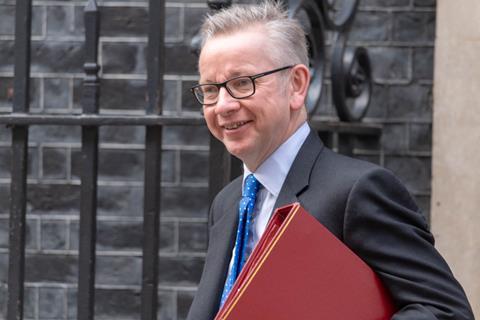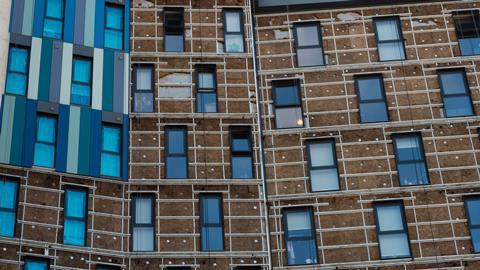Housebuilders set for confrontation with housing secretary over legal wording underpinning £2bn cladding pledge
Developers appear set for a confrontation with Michael Gove after the housing secretary reversed compromises negotiated by his predecessors over the vital legal text underpinning the £2bn cladding pledge.

With the Home Builders Federation (HBF) given a deadline of today to get its final comments back to government on the draft contract, industry sources say Gove appears determined to force through a version of the contract that is close to the original published document, which the HBF at the time told the government was “impossible to sign”.
The HBF has been negotiating over the wording of the legal contract with officials at the Department for Levelling Up, Housing and Communities on behalf of the 48 developers that have signed the “in principle” pledge to fix fire safety concerns on buildings constructed by them going back 30 years.
According to two separate industry sources, a series of compromises over the text were agreed over the summer and autumn while the department had as secretary of state first Greg Clarke and then Simon Clarke. The HBF, after discussions with members, had been concerned the original contract included clauses allowing the government to effectively re-write the contract at any time, and that it didn’t limit the scope of works to be carried out to life-critical building safety works, opening up liabilities for paying for building “betterment”.
In addition, the contract as originally written put all the liability for a JV-built scheme on a single partner, even when they were a minority partner. Together, these clauses are seen to open up a huge additional liability for developer signatories, and all are understood to have been added back into the contract with the return of Gove to the department.
One housebuilding industry source said: “It’s the uncertainty of the contract that is the big problem for housebuilders. Gove could just re-write the agreement at any time. You can’t sign up for a commitment that you just have no way of knowing what the end result is.”
In its half-year results today, developer Berkeley Group said it was in “detailed discussions” with DLUHC regarding the long-form contract that sits alongside the pledge, adding it was important the contract “follows the principles of the Pledge and has both a clear standard against which buildings can be assessed for life-critical fire safety issues, and an independent dispute resolution process.”
>> See also Gove’s return could mean a fight with housebuilders is on the cards
>> See also: What the new building safety act means
>> See also DLUHC warns housebuilders to sign cladding contracts ‘very soon’
A housebuilder chief executive said: “It had looked like we were heading to a negotiated solution, that while still extraordinarily painful, was one we could sign.
“Now we’re back to where we were [before negotiations], and I can see Gove going back to the bully tactics of threatening to remove grant and planning permissions if we don’t comply.”

Gove has previously threatened to use powers brought in under the Building Safety Act to stop housebuilders receiving planning and building control approval as a lever to force housebuilders to sign. Last month Gove told the House of Commons that developers shouldn’t be allowed to use the excuse of economic conditions to “shuffle off their obligations” as regards to “responsibility” around cladding.
At the end of October, shortly after Gove’s re-appointment at the department, a spokesperson said it expected housebuilders to sign the contracts “very soon”, adding that “We will not accept any backsliding on their commitments.”
The 48 developers to sign the pledge, which include all of the largest housebuilders in the industry, have together revealed expected costs of more than £2bn from the commitment to repair homes they built. These commitments are on top of the £2-3bn Residential Property Developer Tax, already brought in, and the proposed £3bn Building Safety Levy, which the industry is also to be expected to pay, with housebuilders arguing that overseas developers, contractors, and materials firms should also be forced to contribute to solve the problem.
A DLUHC spokesperson said: “We are finalising the legally binding contracts that developers will sign to fix their unsafe buildings, and expect them to do so very soon. We will not accept any backsliding on their commitments.
“It is building owners’ legal responsibility to make sure that all buildings are safe. We expect developers and building owners to work at pace to fix their unsafe buildings to ensure people feel safe in their homes. Some are doing so, and we expect all others to follow suit.”
The HBF has been contacted for comment.




























No comments yet